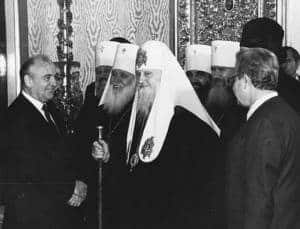Religious leaders in Russia have expressed their condolences on the death of Mikhail Gorbachev, who died on August 30 at the age of 91. They all express their gratitude for his political role in the emergence of religious freedom in the Soviet Union during the so-called “Perestroika” period. Against this background, the silence of the Moscow Patriarch Kirill makes an impression.
“Mikhail Gorbachev, the first president of the USSR, enabled Christians of various faiths in the country to practice their faith freely, and at a later stage of his life he himself became a believer,” Sergei Ryakhovsky, a member of the Public palace of Russia and bishop of the Evangelical Church. “Many of his ideas were desperately needed by society: the desire to have peace, to make the country more open, to solve the problem of the total deficit, and above all, what Christians of all faiths valued him for – he gave people the opportunity to freely believe in God. I knew Mikhail Sergeevich well, I met him more than once. I do not doubt the sincerity of his desire for the best, as well as the fact that at the end of his life he sincerely believed in God,” Ryakhovski said.
Rabbi Alexander Boroda, chairman of the Federation of Jewish Communities in Russia, noted the merits of Mikhail Gorbachev for the protection of the rights of believers, Interfax Religion reported. In his condolence address, Rabbi Boroda noted that under the first president of the USSR, opportunities for freedom of speech and self-expression, freedom of movement and private entrepreneurship appeared in Soviet society. In his address to Gorbachev’s daughter, Irina, he wrote: “Apart from this, I consider it necessary to express my personal gratitude to your father for the revival of religious freedom in our country – thanks to his reforms, a real upsurge and flowering of spiritual life took place.” .
Sheikh Ravil Gainutdin, head of the Russian Spiritual Council of Muslims, said in his condolences that Gorbachev’s political activity was marked by the revision of the state’s atheistic policy regarding the country’s religious communities. He recalled how Gorbachev, still as General Secretary of the Central Committee of the CPSU, allowed Soviet Muslims from Central Asia to perform Hajj in Saudi Arabia in 1989, reports TASS. “May the soul of the deceased rest in peace,” he adds.
The head of the Traditional Buddhist Sangha of Russia XXIV Pandit Khambo Lama Damba Ayusheev expressed his condolences to the relatives and friends of Gorbachev in connection with his death, noting that thanks to Gorbachev, Buddhists in the country received religious freedom.
“I express my deepest condolences to the family, friends and relatives on the occasion of the death of Mikhail Sergeevich Gorbachev. Thanks to his perestroika, the Buddhists got religious freedom and the opportunity to restore our datsans – monasteries and communities,” the Buddhist spiritual leader told TASS.
Teloh Tulku Rinpoche, honorary representative of the Dalai Lama in Russia, Mongolia and the CIS countries, supreme lama of Kalmykia, recalled that in the late 1980s the restoration of Buddhism began slowly, in particular in Buryatia, Kalmykia and Tuva. According to him, Gorbachev set an example of courage and determination by initiating changes in the USSR to improve the lives of the entire society.
Against this background, the silence of the Russian Orthodox Church, and more specifically of the Moscow Patriarch Kirill, makes a strong impression. Apparently, this has to do with the Kremlin’s subdued reaction to his demise. Mikhail Gorbachev will probably not be buried as a head of state, like the first president of the Russian Federation, Boris Yeltsin. According to propaganda, he was responsible for the collapse of the USSR, which led to the humiliation of Russia, which now has to correct his mistake and restore the Soviet empire.
Gorbachev himself says that he is an atheist. In 2008, he stated to “Notices”: “In general, to avoid misunderstandings, I would like to say: I was and remain an atheist…”. He says more than once that he grew up in a religious environment. For example, in an interview with “Komsomolskaya Pravda” he answers the question “Haven’t you started to believe in God?” like this:
“Our whole family was a believer. I was baptized as a child. Although my father and grandfather were communists, there was an icon and a lamp in the red corner. And next to him on the table were portraits of Lenin and Marx. So in our family there was equality between ideology and faith. I don’t go to church myself. And I think it’s hypocritical for people to stand around with candles for show. In front of the TV cameras. During “perestroika”, however, I once gathered the hierarchs of all religions in the Soviet Union in the hall of the Politburo and we created the Law on Freedom of Conscience and Religion. By the way, it still has no analogue in the world.”
Pictured: Meeting of Mikhail Gorbachev with Moscow Patriarch Pimen and hierarchs in 1988.







